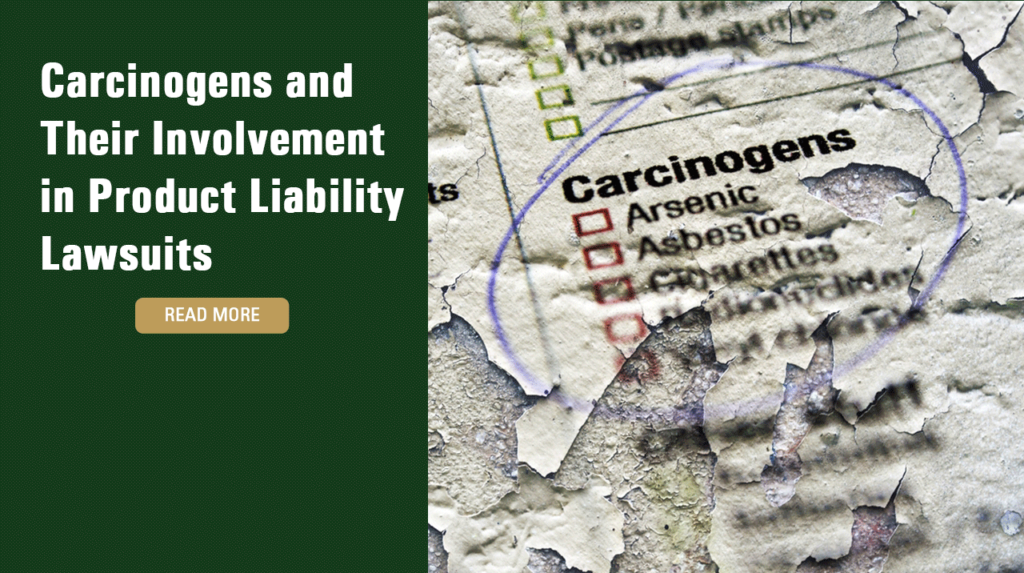Carcinogens and Their Involvement in Product Liability Lawsuits

Many people are seriously injured because of dangerous and defective products that they use as intended. In some cases, people are injured because of products that contain carcinogenic substances that the manufacturers knew about but deliberately concealed the information about the hazards. Manufacturers are legally responsible for informing consumers about the risks posed by their products.
Product liability lawsuits provide a mechanism through which people who have suffered harm because of the hidden dangers of products might recover compensation to pay for their losses while also holding the manufacturers accountable for their actions.
The Philadelphia personal injury attorneys at Raynes & Lawn help negligence victims who have been harmed by carcinogens contained in products to pursue compensation for their losses. Here is some information about carcinogens and how they relate to product liability claims.
Understanding Carcinogens
Carcinogens are substances that are linked to a higher risk of developing cancer. You can be exposed to carcinogenic substances in many different things. Multiple government agencies and international organizations identify potential carcinogens. Group 1 carcinogens are substances with a demonstrated causal relationship between them and the development of cancer for which other causes are ruled out with a reasonable degree of confidence. When a product contains a carcinogen, companies must inform consumers and employees and reduce their exposure when possible. When companies fail to do so, they can be liable to those who are harmed as a result of being exposed to the carcinogen without being warned.

How Products Might Contain Carcinogens
Products might include carcinogenic substances when they are contaminated during the design or manufacturing process when the product or its components are contacted by carcinogens. They might also be carcinogenic when they are composed of toxic substances that can degrade or become active when they interact with other chemicals. These types of risks should be identified in a lab before the products ever enter the market.
Second-Hand Exposure
In some cases, others who come into contact with a person who has been exposed to a carcinogen might also be exposed. These types of cases can be particularly insidious since the victims might not realize they were ever exposed. For example, people who live near airports might be exposed to firefighting foam through contaminated tap water without realizing they are entitled to pursue damages. Many employers, including fire departments, airports, and the U.S. military, used firefighting foam that contained PFOAs, which are chemicals that can build up in the body and cause cancer.

More than a million firefighters are working at fire departments across the U.S. who might have been exposed to the carcinogenic firefighting foam. Asbestos is another example of a carcinogen that has been broadly used in multiple industrial applications and has been shown to cause mesothelioma. In addition to workers who were exposed to asbestos at their jobs, some third parties were also exposed and developed mesothelioma after inhaling asbestos fibers carried home on the workers’ clothes.
Household Carcinogens
In addition to carcinogenic substances in the workplace, many common household products might be carcinogenic. Some examples include Roundup weedkiller and Zantac. CPAP machines have also been linked to cancer because of the degradation of the foam around the mask. The degraded foam can release toxins that can then cause cancer. The makers of Roundup, Zantac, and some CPAP machines are facing thousands of lawsuits because of the carcinogens contained in their products. Many women have also filed lawsuits over talcum-based baby powder manufactured by Johnson & Johnson since some studies have found that the powder might be contaminated with asbestos and might be linked to ovarian cancer.
Product Liability Lawsuits Against Manufacturers
Manufacturers have produced products containing carcinogens for decades. However, there are more lawsuits against manufacturers today than before because they are now being caught. Many of these lawsuits allege that the manufacturers knew that their products contained carcinogens but hid that information and failed to warn the public.
To prevail in a product liability lawsuit against a manufacturer of a carcinogenic product, you will have the duty to prove all of the legal elements of your claim, including the links of causation between the carcinogen and your cancer. If a company fails to produce safe products and warn consumers about known hazards, it can be held liable when someone is harmed as a result.
A product liability attorney at Raynes & Lawn can help determine whether you have a viable claim. We can investigate the product and the manufacturer to determine whether you might be eligible for compensation. Large companies frequently have teams of defense lawyers and experts on hand to try to discredit the claims filed by victims. We can bring in experts and doctors to help to confirm your claims, present evidence, and explain how you were harmed by the defendant’s product. Claims involving carcinogens often involve thorough investigations and can be complex, making it important for you to work with an experienced lawyer.
Get Help from a Philadelphia Personal Injury Attorney
If you have been diagnosed with cancer and believe it might have occurred because of your exposure to a carcinogenic product, you should speak to an attorney at Raynes & Lawn. We have helped many people recover maximal compensation for their injuries for more than 50 years. Through our hard work and using our litigation skills and legal knowledge, we have recovered billions of dollars for our clients. To learn more about your potential claim, call us today at 1-800-535-1797.

For the general public: This Blog/Website is made available by the law firm publisher, Raynes & Lawn, for educational purposes. It provides general information and a general understanding of the law but does not provide specific legal advice. By using this site, commenting on posts, or sending inquiries through the site or contact email, you confirm that there is no attorney-client relationship between you and the Blog/Website publisher. The Blog/Website should not be used as a substitute for competent legal advice from a licensed attorney in your jurisdiction.
For attorneys: This Blog/Website is informational in nature and is not a substitute for legal research or a consultation on specific matters pertaining to your clients. Due to the dynamic nature of legal doctrines, what might be accurate one day may be inaccurate the next. As such, the contents of this blog must not be relied upon as a basis for arguments to a court or for your advice to clients without, again, further research or a consultation with our professionals.
